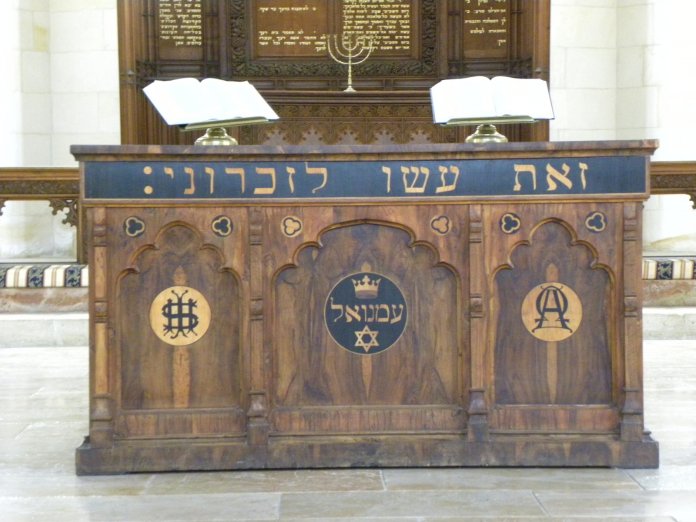Tourists almost never find their way to Levanda Street in southern Tel Aviv. Round the corner from the monstrous concrete central bus station, it looks dirty and feels dangerous. Drug addicts, most of them immigrants from east Africa, many stripped to the waist, lie out in the sun in a rubbish-filled children’s play park. Raggedy toothless prostitutes hustle for a few shekels. Most locals pass quickly through this place, many of them young people in army uniforms travelling between home and their base. They don’t stick around for a coffee or lunch. This is not the Bauhaus city many know and rightly admire. This is the arse-end of Tel Aviv. Yet I still find it the best place in the Holy Land to go to church.
Choosing a church to attend on a Sunday morning in Israel can be a surprisingly tricky business. Perhaps I should not be surprised — after all, Christians now make up a tiny minority of the population. But it’s still hard to shake off the romantic idea that, as the place of Jesus’s ministry, this land has some deep affinity with the world’s largest religion. You can go to what I rather disparagingly think of as Disney churches — places that seem set up for tourists, meeting the expectations of those who come on Holy Land tours, looking for some authentic Jesus-feel. Or, for the more intrepid, you can seek out indigenous Arab Christian churches where Palestinians Christians celebrate the ancient liturgies within settled, long-standing communities. But, despite being a Catholic-inclined kind of Christian, I am more comfortable on the second floor of a swelteringly hot disused office block on Levanda Street, with some Pentecostal preacher shouting at me through a loud and rubbish sound system, the only white person in the room.
I often ask myself why I come to Levanda Street, and not to the local Palestinian churches. After all, they do church pretty much the way I like it. And I have contacts, former colleagues and indeed good friends, who work in these churches. There is an Anglican Diocese of Jerusalem with which my own Diocese of Southwark is twinned. But nonetheless, I still find the politics of the Palestinian churches difficult. And things have gotten a whole lot worse since October 7.
Of course, my own perspective on the current war between Israel and Hamas is shaped by the fact that I am married to an Israeli and have children who carry Israeli passports. Before I came to be welcomed into my wife’s family, I saw the situation differently. I have travelled extensively throughout the West Bank, stayed in Gaza — indeed I’ve been shot at by the Israeli army in Gaza. I would have called myself a pro-Palestinian activist. Passport control at Ben Gurion airport certainly used to treat me that way, with strip searches and endless aggressive questioning. Now they treat me as an honorary Israeli, even allowing me to pass through the passport control for Israeli passport holders. These days it takes mere minutes to pass through.
I hold no candle for the despicable Netanyahu. But nonetheless, I now see the world very differently. What is happening in Gaza is a war. Israel pulled out of Gaza in 2005, dismantling all the settlements that used to be there. Since then, Hamas has built up its military strength, redirecting considerable resources that could have been used for the reconstruction of civil society into tunnels and bomb factories. No society can allow a neighbour, committed to its eradication, to keep firing rockets into its territory. And the massacre of October 7 was a declaration of war — a war that Hamas fights by deliberately putting its own civilians in harm’s way. Israel does all it can to protect its citizens; Hamas does all it can to allow its own to be killed, thus to further their propaganda war in the West. Unlike the leaders of my own Church, I haven’t called for a ceasefire — which I take to be a cynical mechanism for Hamas to gain military advantage over their Jewish enemies. Fellow Christians, especially Palestinians Christians, would think me a warmonger and that I have blood on my hands.
Has the Palestinian Church made peace with the very existence of the state of Israel? The short answer, of course, is that some have and some haven’t. Many Palestinian Christians are Israeli citizens and welcome all the opportunities of living and working in a Western-style liberal democracy. Others, of course, think Israel is nothing of the sort, and rail against what they take to be the institutional racism of Israeli society.
Last October, following the Hamas massacre and the beginnings of the Israeli response, some members of the Anglican congregations in Ramallah and Birzeit wrote to the Archbishop of Canterbury: “As members of our Palestinian society, we Anglican Christians are fighting for our identity which, along with the Palestinians identity, has been under constant attack ever since the onset of the Israeli state.” The letter goes on to speak of “attempts to ethnically cleanse our presence from Palestine”. The Rector of St Andrew’s Ramallah and St Peter’s Birzeit, Father Fadi Diab, preached in Southwark Cathedral, my cathedral, earlier this month. He spoke very movingly of the great suffering of the people of Gaza, linking it to the sufferings of Jesus on the cross. I totally understand that. But nevertheless, he didn’t take the opportunity to condemn Hamas.
Read it all at UnHerd



